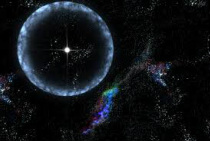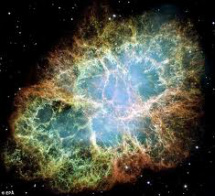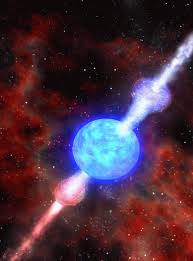 www.nasa.gov
www.nasa.gov Researchers believe the distant star was about 20-30 times the mass of the Sun. When the star ran out of fuel from the material at its core, it exploded and hurled radiation across the cosmos. The core of the star would have collapsed into a black hole, while liberating a powerful jet of energy—the gamma-ray burst.
A blast wave would have caused the rest of the star to expand outwards, creating another dazzling event called a supernova. Although the event was closer to Earth than most gamma-ray bursts that have been detected, the radiation would have posed no danger. Once it reached our planet, the energy would have been absorbed by our atmosphere.
 www.dailymail.co.uk
www.dailymail.co.uk Astronomers suggest that such collisions are responsible for ultra-short bursts of gamma rays occasionally seen across the Universe. The rare cosmic event could produce heavy elements such as gold. Neutron stars are incredibly dense and massive. As well as bursts of light, when they collide they are also expected to send gravity shock waves through the Universe.
Although uncommon, neutron star collisions would generate the enormous fluxes of neutrons needed to make elements heavier than iron, like platinum, lead and gold, by rapid neutron capture.
 www.nrao.edu
www.nrao.edu Fascinating, but the circumstances are out of our control. What I take from this is that there's a reason why gold and platinum are so precious. Giant superstars gave up their life to produce these prized metals. From now on, I will regard my golden wedding band with more reverence and awe—not only does it represent a union made before God, but the metal has been forged by a supernova.
This sense of awe spills over into all my novels that feature a star moonstone ring, set in pure gold. Both the gold and the stone were created from materials made during the original big bang at the beginning of time.

 RSS Feed
RSS Feed






